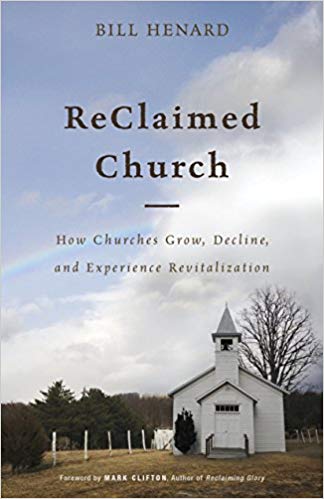Book review: ReClaimed Church
 ChatGPT
ChatGPT Every two or three months there arrives on Christian bookshelves, a new title under the category of “how we do church better.” In the past five years, I have probably read 40 to 50 such titles and gained considerably from them. The latest one, which offers something others do not, is ReClaimed Church: How Churches Grow, Decline, and Experience Revitalization, by Bill Henard (B&H Publishing, 2018). Henard is the Executive Director-Treasurer of the West Virginia Convention of Southern Baptists and is an adjunct professor at Southern Seminary.
Every two or three months there arrives on Christian bookshelves, a new title under the category of “how we do church better.” In the past five years, I have probably read 40 to 50 such titles and gained considerably from them. The latest one, which offers something others do not, is ReClaimed Church: How Churches Grow, Decline, and Experience Revitalization, by Bill Henard (B&H Publishing, 2018). Henard is the Executive Director-Treasurer of the West Virginia Convention of Southern Baptists and is an adjunct professor at Southern Seminary.
A new “Re word” in the lexicon is ReClaimed, meaning to retrieve or recover something previously lost, given or paid, otherwise, says Henard, get back, recoup, claim back, recover, regain or retrieve. Churches have life stages: birth, plateau or decline, he rightly says, and “how the church grows determines its place on the life stage. A church can have a right starting point but head into struggle because its next steps are skewed, or even downright sinful.”
In his introduction, Henard says of his book, “ReClaimed Church offers a process by which a congregation can reassess, rethink, realign and reaffirm its identity, strategy, vision and goals in order to become a viable, growing church once again. This idea is not a magic formula; it is a process that can help a declining church rediscover its purpose and mission.”
Henard takes the reader through the Birth Stage, the Infant Stage, the Adolescent Stage and the Adult Stage. From there he goes into the Plateau Stage, and God forbid, the Death Stage. Like it or not, he tells us, “Declining smaller churches decline much more rapidly than larger churches. Once the declining church goes below 100 in attendance, its days are likely numbered.” [Emphasis added] For churches below 100, their days are numbered, likely within 10 years, he says.
Let me spend a little time on the death spiral. Revitalization is a consultant’s word we will see more and more of (replacing transformation); another such word new in usage on staff titles or in books and articles, is that of strengthening. Revitalization is difficult because “churches wait to try to embrace the changes necessary to get them on a growth plane until they are at a point of desperation or despair.
“The new pastor arrives and there is a sense of hopefulness until he tries to initiate change or deal with some of the reasons for the church’s difficulties. Once a church moves away from the growth plane, it moves toward a nostalgic look to the past and latches onto the power groups or families in the church. They bring a feeling of stability because of their longevity of service and membership.
“The pastor finds opposition, because, when the church does not sustain the immediate attendance bump that they experienced during his first few months, and now old problems have resurfaced, leaders call into question his leadership skills, the search committee’s recommendation for him to be their pastor, and why people continue to leave the church. Therefore, within three years, he has either been fired or has found another place to go.”
Those are tough words, but if churches get into a drift and decline, their leadership needs to understand “the game.” It’s not a sandbox for kids any longer. It’s the real thing. Henard shares eight characteristics that define a dying church (p. 76-78). That eighth characteristic says: “They [the church’s leadership] confuse caring for the building with caring for the church and the community. Often, declining churches see no difference between the building and the church…. [It] is easier to spend time and money fixing a building than doing the hard work to become an indispensable part of the fabric of the community.”
The statistics vary, but Henard says that upwards of 4,000 churches close their doors, or die, every year. “Some would rather die than give up their power seat, not realizing that, if the church ceases to operate, they do not have a seat at the table at all.” Henard says there is hope for churches, if they take up the difficult task of the ReClaimed Church.
More on Church Leadership and Administration
- Church rebranding: 3 things to know (warning) (by Mark MacDonald)
- Why this denomination is booming (by Bob Whitesel)
- Seven reasons why your biggest supporter left the church (by Thom Rainer)
- What does your church look like? (by Mark MacDonald)


